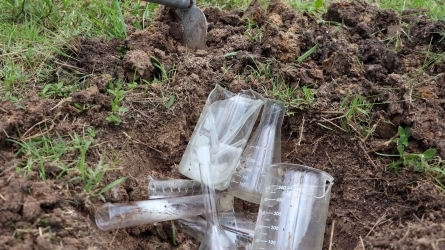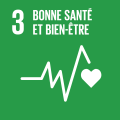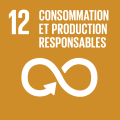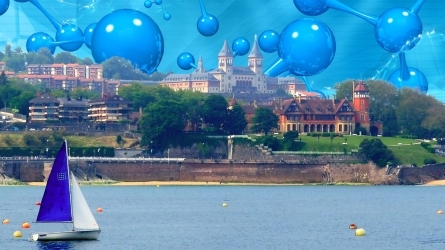
Pharmapollution: the environmental impact of medication
Description
A talk to describe the problem of pharmapollution and discuss possible ways of solving it
We are clearly living in an increasingly polluted world. The toxicity problems caused by hydrocarbons, heavy metals, pesticides and so on are well-known to public opinion. However, for some time now, attention has been paid to the so-called emerging pollutants, among which pharmaceutical drugs play a large part. About 4,000 different pharmacologically active substances are currently estimated to be in use in the world, for both human and veterinary medicine. Consumption of medication is constantly rising, with an estimated 4.5 trillion doses consumed last year alone. Logically, the increased use of drugs will also lead to an increase in the volume of medication waste ending up in the environment.
Medication can reach the environment via many different routes: production, consumption and waste disposal. While waste water is currently considered the primary source, drugs can enter the aquatic environment on other ways, including, for example, aquaculture, run-off water from farming and so on.
Waste water treatment plants are not specifically designed to eliminate pharmaceutical drugs, so some of them are effectively removed but others remain unaffected and are dumped in rivers and ecological niches.
Up to now traces of over 700 different drugs have been detected in the environment, mainly in waste water, rivers and lakes, but also in the ground, air and even in the tap water we drink. Despite everything, there are still many substances we know nothing about, and there are still countries for which the information available is very limited. Some drugs, such as oxacepam, do not break down for decades.
Unfortunately, as well as diclofenac, many other drugs have been shown to cause harm to the environment. The effect of hormonal contraceptives on the feminisation of fish and amphibians, or the appearance of resistance due to dumping of antibiotics, are perhaps the best known. The therapeutic targets and physiological systems on which the drugs we use regularly work are not exclusive to human beings, and many of these signalling pathways and structures exist in many living organisms. Recent studies suggest that certain drugs, like other pollutants such as pesticides, can accumulate throughout the trophic chain, so that concentrations in the tissues of fish and invertebrates may be higher than those we find in rivers and lakes. Furthermore, this process of bioaccumulation is not limited to the aquatic environment, as it has been proven that dung beetles can accumulate anti-parasitic drugs like ivermectin in their tissues.
Pharmaceutical drugs are an essential item that we must protect. The study of pharmapollution must not limit or hinder drugs reaching patients who need them, but this must not stop us finding out more about the effects of drugs in our ecosystems. We cannot separate human and animal health and well-being from the balance with our environment, with the plants, animals and ecological niches with which we coexist. Seeking this balance must be one of our priorities.
Activity directed to
- University students
- Students not from university
- Teachers
- Professionals
- All public
Program
17-06-2021
Eva Caballero kazetariak hizlariekin elkarrizketa izango du hitzaldia amaitutakoan / La periodista Eva Caballero mantendrá un diálogo con los ponentes una vez finalizada la conferencia
Lecture
- Gorka Orive Arroyo UPV/EHU - Doctor en Farmacia. Investigador y profesor titular
- Unax Lertxundi Etxebarria Osakidetza - Doctor en Farmacia. Jefe de Sección de Farmacia. Red De Salud Mental Araba
Speakers

Gorka Orive Arroyo
UPV/EHU, Doctor en Farmacia
Doctor Gorka Oriva, aged 44, is a prolific, multi-faceted pharmacy lecturer, researcher, teacher, educator and entrepreneur. He takes part in a range of research projects. His academic output is outstanding, including a total of 318 international publications, 45 in Spain, 25 book chapters and 3 books as principal editor. He has an h-index of 70 and over 18,400 citations. His academic output is over 20 international articles a year over the last 10 years. He is in the top 1% of scientists by h-index in a sample of 55,000 in Spain. Moreover, in the recent “Top Scientific Rankings” drawn up by Stanford University, he heads the list of the most influential pharmaceutical researchers in Spain, and is one of the top 30 scientists in the world in this category, counting those still working who published their first article in the 21st century. He is founder and CSO of the firm Geroa Diagnostics.

Unax Lertxundi Etxebarria
Osakidetza, Doctor en Farmacia
Unax Lertxundi works as Head of the Pharmacy Section in the Araba Mental Health Network, part of Osakidetza, the Basque Health Service. In 2002 he came first in the national entrance examination for FIR, or Resident In-House Pharmacists. Holder of a doctorate in Pharmacy from the University of the Basque Country (special prize-winner), he has led and taken part in numerous research projects, and is the author of more than 60 articles in international academic journals and 60 conference papers, having won numerous awards. He is also one of 16 European professionals to be a Board Certified Psychiatric Pharmacy (BCPP) specialist, awarded by the prestigious American Pharmacists Association.
Venue
Miramar Palace
Pº de Miraconcha nº 48. Donostia / San Sebastián
Gipuzkoa
Miramar Palace
Pº de Miraconcha nº 48. Donostia / San Sebastián
Gipuzkoa
Sustainable development goals
Agenda 2030 is the new international development agenda approved in September 2015 by the United Nations. This agenda aims to be an instrument to favour sustainable human development all over the planet, and its main pillars are the eradication of poverty, a reduction in equality and vulnerability and fostering sustainability. It is a unique opportunity to transform the world up to 2030 and guarantee human rights for all.

3 - Good health and well-being
Guarantee a healthy life and foster the well-being of all people of all ages. Key issues: universal healthcare coverage, sexual and reproductive health, reduction in the number of road accident casualties, pollution and chemical products, reduction in maternal and neonatal mortality, the end of epidemics such as AIDS, combating hepatitis and other water-borne diseases, drug and alcohol prevention, control of tobacco.
More information
12 - Responsible consumption and production
Guarantee sustainable modalities of consumption and production. Key issues: sustainable management and efficient use of natural resources, reduction of chemical particles released to the atmosphere, water and soils, reduction of waste products, recycling, reuse and reduction, sustainable practices, sustainable public procurement, sustainable lifestyles, rationalisation of inefficient subsidies for fossil fuels.
More information




